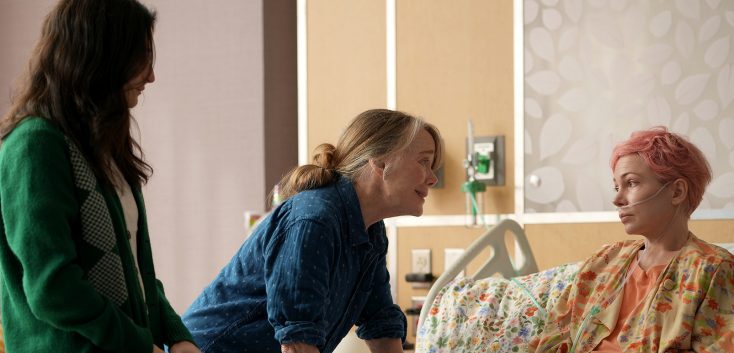By JUDY SLOANE
Front Row Features
HOLLYWOOD-F/X’s limited series “Dying for Sex” begins streaming on Hulu in the U.S. and on Disney+ in all other territories on April 4, 2025. It is inspired by the true story of Molly Kochan; a story that was originally shared on a Wondery podcast created by her best friend, Nikki Boyer.
On learning that she has terminal cancer, Molly, (portrayed by five- time Academy Award winning actress Michelle Williams) leaves her husband to explore her sexual desires for the first time in her life. She is encouraged and supported by her best friend Nikki, who stays by her side until the very end.
The series is co-created and executive produced by Kim Rosenstock (“Only Murders in the Building,” “New Girl”) and Elizabeth Meriwether (“New Girl,” “The Dropout”) and all eight episodes are available to stream on April 4th.
Michelle Williams spoke with the TV Critics Association about her new and challenging role.
Q: Throughout your career you have consistently chosen complex, rich characters. What specifically drew you to Molly’s story in “Dying for Sex?”
Michelle Williams: I think the first thing that drew me was the script because that was my entrance to the project. I just thought, my God, is that as good as I think it is? It’s not very often that you get to come into contact with material that really surprises you and offers you a different opportunity than what you have been given in the past. It’s just like a splash of water. You’re like, wait, is that out there and could it really be for me? And then I got pregnant and [it] got put on hold for about a year and a half, and then I returned to it when I was ready to go back to work … and here we are.
Q: When did you first hear the original Dying for Sex podcast?
Michelle Williams: When this came to me there was one script, the first episode. I finished it and I thought, well, — wow. Hm, interesting. And then I discovered the podcast for the first time, and it laid out the entire journey and I found myself on the floor, weeping. I was completely overcome by it. I listened to it for a second time so that I could understand why I was so moved by it; [I] couldn’t understand why, and so I knew I had to go make this show to understand why this expression of female friendship and sexuality had so overwhelmed my regulatory system that I couldn’t speak.
Q: Being a mom, did you have any reservations getting
onboard with this?
Michelle Williams: Somewhere in the back of my head I hear somebody saying to me, don’t do something that your grandmother couldn’t see. But in the forefront of my mind what I hear is, make things that you would want your children to see, age appropriate; I want to leave a record of who I was. And if my children are interested in it, they can pick that up and they can learn what I was doing when I wasn’t with them. I’ve always wanted to make something that I would feel proud of and that even they, as they grew up, could feel a deeper understanding of who I was and what I was interested in. So I stand behind this; and went wholeheartedly into the experience.
Q: How did you prep for acting out all these very different and impressive variations of orgasms?
Michelle Williams: One of the things that I have come to learn about myself is that I love to leap and then look. And that’s how I felt about these scenes. But what I felt really blessed by was that there were
people looking with me.
Q: What was the most touching fact about Molly you’ve learned?
Michelle Williams: Oh, my gosh. There’s so much to choose from. I’m going to talk about something that really appeared to me in the podcast which was as she opened herself up to these sexual encounters she observed the people that were put in her path with what I would call radical acceptance of their bodies and what they desired and how their desires surprised themselves, and how their desires had weighed them down and made them feel ashamed. I think perhaps it was Molly’s own radical acceptance that she was having to face being in a failing body, something about Molly opened them up and allowed them to put words, maybe for the first time, to something that had been on their mind. And I think to be that person to somebody else is such a healing exchange.
I wouldn’t want for anybody that I love to be denied of any pleasure. These situations that Molly found herself in, of being able to be in charge or to have power, it’s a smaller part of a larger healing journey. To be able to view sex within that framework, take out the negativity and the shame, I think is a big piece of work and something that I continue to think about.






